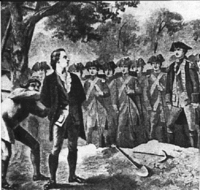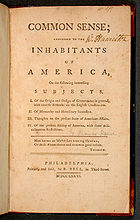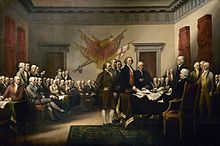
1776
Related subjects: Years
About this schools Wikipedia selection
This Wikipedia selection is available offline from SOS Children for distribution in the developing world. All children available for child sponsorship from SOS Children are looked after in a family home by the charity. Read more...
| Millennium: | 2nd millennium |
|---|---|
| Centuries: | 17th century – 18th century – 19th century |
| Decades: | 1740s 1750s 1760s – 1770s – 1780s 1790s 1800s |
| Years: | 1773 1774 1775 – 1776 – 1777 1778 1779 |
| 1776 by topic: | |
| Arts and Sciences | |
| Archaeology – Architecture – Art – Literature ( Poetry) – Music – Science | |
| Countries | |
| Canada – Great Britain – United States | |
| Lists of leaders | |
| Colonial governors – State leaders | |
| Birth and death categories | |
| Births – Deaths | |
| Establishments and disestablishments categories | |
| Establishments – Disestablishments | |
| Works category | |
| Works | |
| Gregorian calendar | 1776 MDCCLXXVI |
| Ab urbe condita | 2529 |
| Armenian calendar | 1225 ԹՎ ՌՄԻԵ |
| Assyrian calendar | 6526 |
| Bahá'í calendar | -68–-67 |
| Bengali calendar | 1183 |
| Berber calendar | 2726 |
| British Regnal year | 16 Geo. 3 – 17 Geo. 3 |
| Buddhist calendar | 2320 |
| Burmese calendar | 1138 |
| Byzantine calendar | 7284–7285 |
| Chinese calendar | 乙未年十一月十一日 (4412/4472-11-11) — to — 丙申年十一月廿一日(4413/4473-11-21) |
| Coptic calendar | 1492–1493 |
| Ethiopian calendar | 1768–1769 |
| Hebrew calendar | 5536–5537 |
| Hindu calendars | |
| - Vikram Samvat | 1832–1833 |
| - Shaka Samvat | 1698–1699 |
| - Kali Yuga | 4877–4878 |
| Holocene calendar | 11776 |
| Igbo calendar | |
| - Ǹrí Ìgbò | 776–777 |
| Iranian calendar | 1154–1155 |
| Islamic calendar | 1189–1190 |
| Japanese calendar | An'ei 5 (安永5年) |
| Juche calendar | N/A (before 1912) |
| Julian calendar | Gregorian minus 11 days |
| Korean calendar | 4109 |
| Minguo calendar | 136 before ROC 民前136年 |
| Thai solar calendar | 2319 |
Year 1776 (MDCCLXXVI) was a leap year starting on Monday (link will display the full calendar) of the Gregorian calendar and a leap year starting on Friday of the 11-day slower Julian calendar.
Events
January–February
- January 1 – American Revolutionary War: Burning of Norfolk: The town of Norfolk, Virginia, is destroyed by the combined actions of the British Royal Navy and occupying Patriot forces.
- January 10 – American Revolution: The radical Thomas Paine publishes his pamphlet Common Sense "written by an Englishman" in Philadelphia arguing for independence from British rule in the Thirteen Colonies.
- January 20 – American Revolution: South Carolina Loyalists led by Robert Cunningham sign a petition from prison agreeing to all demands for peace by the formed state government of South Carolina.
- January 24 – American Revolution: Henry Knox arrives at Cambridge, Massachusetts, with the artillery that he has transported from Fort Ticonderoga
- February 17 – Edward Gibbon publishes the first volume of The History of the Decline and Fall of the Roman Empire.
- February 27 – American Revolution: Battle of Moore's Creek Bridge: Scottish North Carolina Loyalists charge across Moore's Creek bridge near Wilmington to attack what they mistakenly believe to be a small force of rebels. Several loyalist leaders are killed in the ensuing battle. The patriot victory virtually ends all British authority in the town.
March–April
- March 2– 3 – The American Revolution:
- Battle of Nassau: The American Continental Navy and Marines make a successful assault on Nassau, Bahamas.
- Battle of the Rice Boats: American Patriots resist the Royal Navy on the Savannah River. British control over the Province of Georgia is lost.
- March 4 – American Revolution: American Patriots capture Dorchester Heights dominating the port of Boston, Massachusetts.
- March 9 – Scottish economist Adam Smith publishes The Wealth of Nations in London.
- March 17 – American Revolution: Threatened by Patriot cannons on Dorchester Heights, the British evacuate Boston.
- March 28 – Juan Bautista de Anza finds the site for the Presidio of San Francisco.
- April 12 – American Revolution: The Royal Colony of North Carolina produces the Halifax Resolves making it the first British colony officially to authorize its Continental Congress delegates to vote for independence from the Kingdom of Great Britain.
May–June
- May 1 – Adam Weishaupt founds the Order of the Illuminati in Ingolstadt, Bavaria.
- May 4 – Rhode Island becomes the first American colony to renounce allegiance to King George III of Great Britain.
- May 15– 26 – American Revolution: Battle of The Cedars: British forces skirmish with the American Continental Army around Les Cèdres, Quebec.
- June 7 – American Revolution: Richard Henry Lee of Virginia proposes to the Second Continental Congress (meeting in Philadelphia) that "these united colonies are, and of right ought to be, free and independent states."
- June 8 – American Revolution: Battle of Trois-Rivières: The invading American Continental Army is driven back at Trois-Rivières, Quebec.
- June 11 – American Revolution: The Continental Congress appoints a committee to draft the Declaration of Independence.
- June 12 – American Revolution: Virginia Declaration of Rights by George Mason adopted by the Virginia Convention of Delegates.
- June 15 – American Revolution: Delaware Separation Day: The Delaware General Assembly votes to suspend government under the British Crown.
- June 17 – Lt. Jose Joaquin Moraga leads a band of colonists from Monterey Presidio, landing on June 29 and constructing the Mission Dolores of the new Presidio of San Francisco.
July–August
- July 2 – American Revolution: The final (despite minor revisions) U.S. Declaration of Independence is written. The Continental Congress passes the Lee Resolution.
- July 4 – American Revolution: United States Declaration of Independence: The Continental Congress ratifies the declaration by the United States of its independence from the Kingdom of Great Britain.
- July 8 – American Revolution: The Liberty Bell rings in Philadelphia for the first public reading of the Declaration of Independence.
- July 9 – American Revolution: An angry mob in New York City topples the equestrian statue of George III of Great Britain in Bowling Green.
- July 12 – Captain James Cook sets off from Plymouth, England, on his third, and fatal, expedition to the Pacific Ocean.
- July 21 – Mozart's Serenade No. 7 (the "Haffner") is first performed in Salzburg, Austria.
- August 2 – Most of the American colonies ratify the Declaration of Independence.
- August 15 – American Revolution: First Hessian troops land on Staten Island to join British forces.
- August 27 – American Revolution: Battle of Long Island: Washington's troops routed in Brooklyn by British under William Howe.
September–October
- September – First running of the St. Leger Stakes horse race in England.
- September 6 – Hurricane hits Guadeloupe, killing more than 6000.
- September 7 – American Revolution: World's first submarine attack. American submersible craft Turtle attempts to attach a time bomb to the hull of British Admiral Richard Howe's flagship HMS Eagle (1774) in New York Harbour.
- September 11 – American Revolution: abortive peace conference between British and Americans on Staten Island.
- September 15 – American Revolution: Landing at Kip's Bay: British troops land on Manhattan at Kips Bay.

September 22: British hang spy Nathan Hale in New York City.
- September 16 – American Revolution: Battle of Harlem Heights: The Continental Army under Washington are victorious against the British on Manhattan.
- September 22 – American Revolution: Nathan Hale executed in New York City for espionage.
- October 7 – Crown Prince Paul of Russia marries Sophie Marie Dorothea of Württemberg.
- October 9 – Father Francisco Palou founds the Mission San Francisco de Asis in what is now San Francisco, California.
- October 11 – American Revolution: Battle of Valcour Island: On Lake Champlain near Valcour Island, a British fleet led by Sir Guy Carleton defeats 15 American gunboats commanded by Brigadier General Benedict Arnold. Although nearly all of Arnold's ships are destroyed, the two day-long battle will give Patriot forces enough time to prepare defenses of New York City.
- October 18 – American Revolution: Battle of Pell's Point: Troops of the American Continental Army resist a British and Hessian force in The Bronx.
- October 28 – American Revolution: Battle of White Plains: British forces arrive at White Plains, attack and capture Chatterton Hill from the Americans.
- October 31 – In his first speech before British Parliament since the Declaration of Independence that summer, King George III acknowledges that all is not going well for Britain in the war with the United States.
November–December
- November 16 – American Revolution: Hessian mercenaries under Lieutenant General Wilhelm von Knyphausen capture Fort Washington from the American Continentals. The captain of the American navy ship Andrew Doria fires a salute to the Dutch flag on Fort Oranje and Johannes de Graaff answers with eleven gun shots.
- December 5 – The Phi Beta Kappa society is founded at the College of William and Mary.
- December 7 – American Revolution: Marquis de Lafayette attempts to enter the American military as a major general.
- December 21 – American Revolution: The Royal Colony of North Carolina reorganizes into the State of North Carolina after adopting its own constitution. Richard Caswell becomes the first governor of the newly formed state.
- December 23 – American Revolution: Thomas Paine, living with Washington's troops, begins publishing The American Crisis, containing the stirring phrase, "These are the times that try men's souls."
- December 25 – American Revolution: Gen. George Washington orders the first issue of The Crisis read to his troops on Christmas Eve, then at 6 p.m. all 2600 of them march to McKonkey's Ferry, cross the Delaware River and land on the Jersey bank at 3 a.m.
- December 26 – American Revolution: Battle of Trenton: Washington's troops surprise the 1500 Hessian troops under the command of Col. Johann Rall at 8 a.m. outside Trenton and score a victory, taking 948 prisoners while suffering only 5 wounded.
Births
- January 24 – E.T.A. Hoffmann, German writer, composer, and painter (d. 1822)
- February 11 – Joannis Capodistrias, Greek governor of Troezen (d. 1831)
- March 10 – Louise of Mecklenburg-Strelitz, Queen of Prussia (d. 1810)
- April 1 – Sophie Germain, French mathematician (d. 1831)
- May 20 – Simon Fraser, Canadian explorer (d. 1862)
- June 11 – John Constable, English painter (d. 1837)
- June 28 – Charles Mathews, English Theatre actor (D. 1835)
- July 4 – Per Aron Borg, sign language creator (d. 1839)
- August 9 – Amedeo Avogadro, Italian chemist (d. 1856)
- December 27 – Nikolay Kamensky, Russian general (d. 1811)
- December 31 – Johann Spurzheim, German physician (d. 1832)
- date unknown
Deaths
- March 10
- Élie Catherine Fréron, French critic (b. 1719)
- Niclas Sahlgren, Swedish merchant and philanthropist (b. 1701)
- March 24 – John Harrison, English clockmaker (b. 1693)
- March 26 – Samuel Ward, American politician (b. 1725)
- April 29 – Edward Wortley Montagu, English traveler and writer (b. 1713)
- May 4 – Jacques Saly, French sculptor (b. 1717)
- June 10 – Leopold Widhalm, Austrian luthier (b. 1722)
- June 20 – Benjamin Huntsman, English inventor and manufacturer (b. 1704)
- July 7 – Jeremiah Markland, English classical scholar (b. 1693)
- July 10 – Richard Peters, English-born clergyman (b. 1704)
- August 1 – Francis Salvador, American patriot (b. 1747)
- August 2 – Louis François I, Prince of Conti, French military leader (b. 1717)
- August 25 – David Hume, Scottish philosopher (b. 1711)
- September 22 – Nathan Hale, American Revolutionary War captain, writer and patriot (executed) (b. 1755)
- October 17 – Pierre François le Courayer, French theologian (b. 1681)
- November 17 – James Ferguson, Scottish astronomer (b. 1710)


